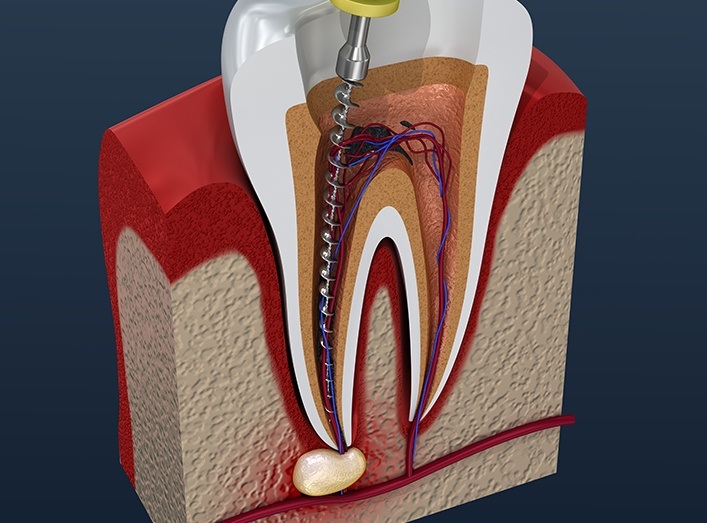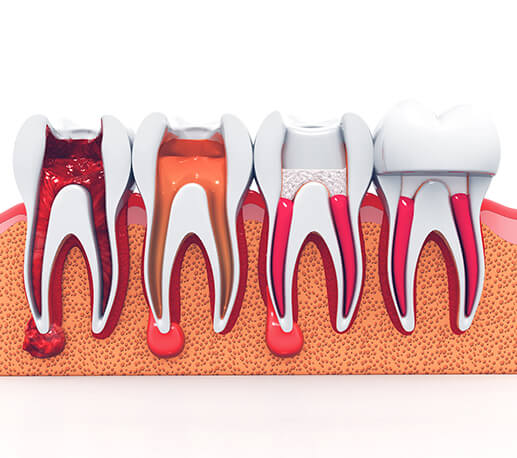Do you have a severe toothache that’s waking you up in the middle of the night or keeping you from being able to focus on work? We offer root canal therapy to eliminate your pain while also preserving your natural tooth. This procedure is virtually painless and can make even the worst toothaches quickly disappear. If you’re experiencing terrible dental pain, don’t hesitate to contact our dental office so we can schedule an appointment as soon as possible for pain relieving root canal therapy in Granger, IN.
When Is Root Canal Therapy Necessary?
If we recommend a root canal for your smile, you can know that it is needed to keep your natural tooth healthy, especially because the alternative is extraction. A root canal may be the best or only treatment choice you have when the pulp, or soft nerve center of the tooth, is exposed to harmful bacteria. This can happen if the tooth has suffered trauma from an injury or severe tooth decay. Regardless of the reason, you can depend on us to make the entire process simple and painless.
Root Canal FAQs
If you need a root canal in Granger, it can make your palms sweat, but you don’t have anything to fear. We know you might feel a little apprehensive about the road ahead, so we’ll explain everything at your consultation to ease any anxieties. While you wait for your appointment, here are the answers to a few frequently asked questions about root canals.
Learn More
Is the recovery going to be painful?
You don’t have to worry about a long, painful recovery after root canal therapy. While you won’t feel anything during your procedure, it’s normal for your mouth to be a little tender for a few days. You can manage your discomfort using an OTC pain reliever or anti-inflammatory. Your dentist in Granger will instruct you to eat softer foods for a few days. You’ll also want to chew on the opposite side of your mouth. After about 3 days, your discomfort should improve. If it doesn’t get any better or worsens, contact our office for further instructions.
Do I still need a root canal if my toothache went away?
If your throbbing, persistent toothache suddenly disappears, you might believe the problem has been resolved, so you don’t need a root canal anymore. Unfortunately, you’re not off the hook. A root canal is not a form of pain management. Instead, it’s necessary to treat an infection deep within your tooth. Just because your pain went away doesn’t mean the infection is gone. Without any treatment, it can spread to your surrounding teeth, gums, jawbone, and other body parts. If your dentist recommends a root canal, it’s best not to wait, even if you’re not in pain.
How long does a root canal last?
Root canals have a very high success rate when performed by a qualified dentist. Most teeth treated with the endodontic procedure can retain normal chewing functions for years, if not for a lifetime. However, various factors affect the lifespan of your treatment, like the severity of the initial damage and if there were any delays between the temporary and permanent restorations. You can ensure your tooth thrives for years by committing to your oral hygiene at home and visiting your dentist at least twice a year for a cleaning and checkup.
How long does a root canal take?
Every situation differs, but most root canal procedures take 30 to 90 minutes, depending on the complexity of your case. The back teeth can require more time because they have multiple roots. While the root canal can be performed in a single appointment, you may need a filling or dental crown to protect your tooth. After your root canal, your tooth will be prepared for the restoration. It can take the dental lab a couple of weeks to craft your restoration to your specifications. You’ll return to the dentist after it has been sent back to the office. Any temporary material will be removed, and your crown will be bonded to your tooth. We will explain exactly how long you can expect your treatment to take at your initial consultation.



